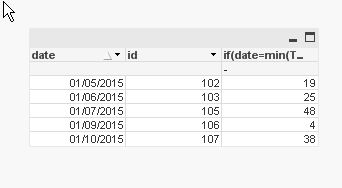Unlock a world of possibilities! Login now and discover the exclusive benefits awaiting you.
- Qlik Community
- :
- All Forums
- :
- QlikView App Dev
- :
- Above Function with in Set Analysis
- Subscribe to RSS Feed
- Mark Topic as New
- Mark Topic as Read
- Float this Topic for Current User
- Bookmark
- Subscribe
- Mute
- Printer Friendly Page
- Mark as New
- Bookmark
- Subscribe
- Mute
- Subscribe to RSS Feed
- Permalink
- Report Inappropriate Content
Above Function with in Set Analysis
Hi all,
Can I write Above() function within set analysis?? If Yes then How?
Actually I want to limit dimensions in straight table based on the condition that, if a column value in a row is same as that in above row, I want to exclude the row.How to obtain this with expression?
Example :
Input:
| date | id | value |
| 01/05/2015 | 102 | 19 |
| 01/06/2015 | 103 | 25 |
| 01/07/2015 | 105 | 48 |
| 01/08/2015 | 105 | 65 |
| 01/09/2015 | 106 | 4 |
| 01/10/2015 | 107 | 38 |
Output should be :
| date | id | value |
| 01/05/2015 | 102 | 19 |
| 01/06/2015 | 103 | 25 |
| 01/07/2015 | 105 | 48 |
| 01/09/2015 | 106 | 4 |
| 01/10/2015 | 107 | 38 |
Kindly Note:- Here value is the only expression.
Accepted Solutions
- Mark as New
- Bookmark
- Subscribe
- Mute
- Subscribe to RSS Feed
- Permalink
- Report Inappropriate Content
- Mark as New
- Bookmark
- Subscribe
- Mute
- Subscribe to RSS Feed
- Permalink
- Report Inappropriate Content
Hi Timanshu,
I have managed to get the output as above but i didnt use the above function.
I just assigned '1'as flag to each record and then aggregated it by id.
then i created an expression which checks the value of aggregation....for the duplicate id field you will get aggr as null.
Also i created a calculated expression to show the date only for unique ids.
Attaching the qvw.
Hope it helps.:)
- Mark as New
- Bookmark
- Subscribe
- Mute
- Subscribe to RSS Feed
- Permalink
- Report Inappropriate Content
if(date=min(TOTAL <id> date), sum(value))

- Mark as New
- Bookmark
- Subscribe
- Mute
- Subscribe to RSS Feed
- Permalink
- Report Inappropriate Content
Create a Straight Table
Dimension
date
id
expression
=Aggr(Min(value),id)
- Mark as New
- Bookmark
- Subscribe
- Mute
- Subscribe to RSS Feed
- Permalink
- Report Inappropriate Content
One more way to do it...
Create a Straight Table
Dimensions
1) Calculated Dimension
Aggr(MIN(date),id)
2) id
Expression
Min(value)
- Mark as New
- Bookmark
- Subscribe
- Mute
- Subscribe to RSS Feed
- Permalink
- Report Inappropriate Content
Thanks Shashi
Your Solution gives the same output, however I only need to do this work by changing expressions.
- Mark as New
- Bookmark
- Subscribe
- Mute
- Subscribe to RSS Feed
- Permalink
- Report Inappropriate Content
Thanks Massimo
It works.
- Mark as New
- Bookmark
- Subscribe
- Mute
- Subscribe to RSS Feed
- Permalink
- Report Inappropriate Content
Hi Manish,
Thanks for reply.
This actually gives me minimum value but It should show value that occurs First according to date.
- Mark as New
- Bookmark
- Subscribe
- Mute
- Subscribe to RSS Feed
- Permalink
- Report Inappropriate Content
Then my 2nd solution should work.